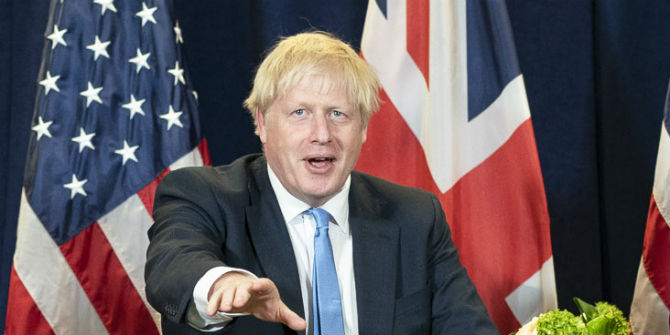Sinn Fein’s presence in the Commons would help focus the government’s mind on the consequences of a hard Brexit for Northern Ireland, writes Sean Swan. The very real prospect of a hard border means the time has come for Sinn Fein to decide whether it is playing the game of politics or not.
The achievement of peace in Northern Ireland cannot be understood simply in terms of the signing of the 1998 Good Friday Agreement. Peace was not an event: it was a process. That process was long and complex, but certain events were central to it. One such event was a speech given in November 1990 by Peter Brooke, then Northern Ireland secretary, stating that:
The British government has no selfish strategic or economic interest in Northern Ireland: our role is to help, enable and encourage. Britain’s purpose […] is not to occupy, oppress or exploit, but to ensure democratic debate and free democratic choice.
An advance copy of this speech had secretly been supplied to the leadership of the IRA. The intent was to demonstrate that London was neutral between nationalists and unionists in Northern Ireland. London’s position now was that the constitutional position of Northern Ireland was a matter solely for the people of Northern Ireland. The aim was to convince the republican movement that London could be trusted to act as an honest broker: “It is not the aspiration to a sovereign, united Ireland against which we set our face, but its violent expression.”
Brooke’s speech laid the foundation for the Downing Street Declaration on 15 December, 1993, in which the Prime Minister, John Major, and the Taoiseach, Albert Reynolds, agreed that the constitutional position of Northern Ireland was for its people to decide. Major also reiterated that the British government:
have no selfish strategic or economic interest in Northern Ireland. Their primary interest is to see peace, stability and reconciliation established by agreement among all the people who inhabit the island, and they will work together with the Irish Government to achieve such an agreement, which will embrace the totality of relationships
It was also noted that the newly created European Union would “require new approaches to serve interests common to both parts of the island of Ireland, and to Ireland and the United Kingdom as partners in the European Union.”
The Declaration paved the way for an IRA ceasefire which was announced on 31 August, 1994. The republican movement’s understanding was that the ceasefire would lead to Sinn Fein’s inclusion in peace talks. However, internal British politics were to complicate matters. The 1992 general election had given the Tories a slim ten seat majority. This majority was rendered even less secure by the constant threat of rebellion from Eurosceptic ‘bastards’ within the ranks of the parliamentary Conservative party itself.
It was a minority government in all but name. By the end of 1995 the Tory majority had eroded to only two. The prime minister, John Major, was increasingly dependent on the support of nine Ulster Unionist (UUP) MPs to stay in power. But keeping the Unionists on side came at the cost of taking, or at the very least being perceived to take, the Unionists’ side in relation to the peace process. The IRA ceasefire continued, but the peace talks Sinn Fein had assumed would follow never took place. Instead there were new demands for decommissioning of IRA arms and of the need for a ‘decontamination’ period before talks could take place.
Finally, with no progress having been made towards peace talks and growing unease about the entire process within the IRA, the IRA ended its ceasefire on 9 February 1996. Their statement announcing the fact noted that “Time and again, over the last 18 months, selfish party political and sectional interests in the London parliament have been placed before the rights of the people of Ireland”. This marked the start of a new IRA campaign which avoided violence in Northern Ireland in favour of a bombing campaign in England.
The Labour government elected on 1 May 1997 had a secure majority and was thus free to act impartially on Northern Ireland. However, the IRA did not immediately restore its ceasefire following this election. The leadership needed to reassure its volunteers that it, not events in London, would decide when a new ceasefire would be called. This was achieved by the symbolism of not ending its new campaign until it had lasted exactly as long as had the first ceasefire – 526 days.
Once the IRA restored its ceasefire on 20 July, 1997, the peace process proceeded relatively smoothly, culminating in the Good Friday Agreement the following Easter. The heart of the Agreement was the principle of consent – Northern Ireland’s constitutional position would be determined by the people of Northern Ireland; parity of esteem – the right of people in Northern Ireland to identify as British, Irish or both, and hold Irish and/or British passports; and the ‘three strands’ – relationships within Northern Ireland, between North and South, and between Ireland and Great Britain. Unlike the Downing Street Declaration, the EU was barely mentioned in the Agreement as it was then assumed to be a permanent backdrop to Anglo-Irish relations. Peace was also implicitly premised on the border becoming invisible and largely irrelevant.
 Credit: Public Domain.
Credit: Public Domain.
The entire substance of the peace agreement is now being washed away. Speaking in Belfast on 20 July 2018, Theresa May stated that the British government “will never be neutral in our support for the union” – a total negation of the Downing Street declaration. The ‘backstop’ supposedly agreed to avoid a hard post-Brexit border was dumped on 16 July by an amendment to the Taxation (Cross-border Trade) Bill. The Northern Ireland Assembly – the heart of ‘strand one’ of the Agreement – has been moribund since January 2017; the North-South Ministerial Council – the heart of ‘strand two’ – has not met since November 2016.
The fact that the Conservatives are dependent on Ulster Unionist votes to stay in power – this time the DUP – is hardly coincidental to this state of affairs, nor is the fact that the Tories themselves are deeply divided. It is a re-run of the Major years. That experience may be why, following the 2017 general election, Major warned the Tories of the dangers of a deal with the DUP. Describing the current peace as “fragile” Major pointed out that a “fundamental part of that peace process is that the UK government needs to be impartial between all the competing interests in Northern Ireland”.
The situation in Northern Ireland itself has become increasingly fraught. Derry has witnessed serious violence in recent weeks, orchestrated by Dissident republicans whose growing audacity can be judged by their recent attack on the home of former Sinn Fein president Gerry Adams. The peace process was premised on creating a political route forward, but politics cannot exist in a vacuum. And a vacuum is now where Sinn Fein finds itself. It has succeeded in becoming the majority nationalist party in Northern Ireland, but absent a functional Northern Ireland Assembly, coupled with Sinn Fein’s continuing adherence to an Abstentionist policy in relation to Westminster, there is no political forum.
It is this political vacuum and the real possibility of a hard Brexit and a hard border, which is proving fertile ground for Dissident republicans. The risks of dropping Abstentionism – not least of providing a propaganda coup for Dissidents – are well known but are now not as serious as the risks posed by the current situation. In fact, to the extent that Abstentionism is rendering politics futile, it helps make the Dissidents’ case that politics is pointless and the only solution is ‘armed struggle’.
Had the Sinn Fein MPs been present in the House of Commons on 16 July, they could possibly have brought the government down and an ensuing general election might have returned a government opposed to a hard Brexit. In any case, Sinn Fein’s presence in the Commons would help focus the government’s mind on the full realities of Northern Ireland. Hard Brexiteers would not be happy to be denied their Brexit by Sinn Fein, but Northern Ireland is either fully part of the UK, warts and all, or it isn’t – and if it is, its MPs, all of them, are fully entitled to vote on any matter before the House.
Finally, Sinn Fein needs to remember that the 2017 general election was a crisis election. The nationalist community in Northern Ireland returned seven Sinn Fein MPs, the party’s best ever result. If, because of Abstentionism, Sinn Fein cannot prevent a hard Brexit and ensuing hard border, that community will not be blind to the fact that had they returned seven SDLP MPs – or even seven Alliance MPs – a hard Brexit could have been prevented. And they are likely to remember that in future elections. Sinn Fein is either playing the game of politics or it isn’t; if it is, it cannot do so with one arm tied behind its back. The time has come to drop Abstentionism.
This article gives the views of the author(s), and not the position of LSE Brexit, nor of the London School of Economics and Political Science. It first appeared on LSE British Politics and Policy.
Sean Swan is a Lecturer in the Department of Political Science at Gonzaga University. He is the author of Official Irish Republicanism, 1962 to 1972 (2007).







Sinn Fein will never drop abstentionism. To do so would go against all their principles which see the UK as an illegitimate occupying force in Ireland. Additionally, if there is a hard border the resulting hardships will merely reinforce their arguments that NI is harmful both to it’s own citizens and the rest of Ireland.
It’s dangerous to post this sort of blog at this time, that could ultimately cost lives.
It could be seen as incitive! When it may be completely wrong and a hard border may or may not happen.
To suggest that Sinn Fein should use its vote to bring down a government has two possible motives.
1/ to thwart the electorates will.
2/ to see a labour government under a left wing extremist elected.
Either one of those would be a disaster
The comments should be left until the outcome is more certain and clarity to the negotiations is achieved not trying to incite revolt!!!!
How low can one go????
Increasingly I see this LSE as project fear propaganda
Getting more and more desperate
So what you are saying is that those who voted for Sinn Fein don’t represent our are not part of the people? Are you suggesting that those who voted for the DUP do?
I would have thought that a hard border in Ireland quite suits Sinn Fein, which is after all a revolutionary party, if now a non-violent one.
Why would it want to stop such a situation developing, which would make it clear to the world that “Northern Ireland is an artificial state supported by the British establishment and British money”. These latter comments are a half-remembered (by me!) paraphrase of what the late Fianna Fail PM Charles Haughey once said about Northern Ireland.
Comments about the Skripal case have been removed because they are off-topic.
Nationalists in the North are fully behind SF’s policy in rejecting Westminister – this is patently clear and somewhat surprising that the author does not appear to be aware of this.
If SF were to take seats at Westminster, the British Press, the British Tory party and the British Right wing would go into over-drive to prevent any possible SF influence on British Brexit policy (whatever it is).
The SNP, for example, with a far greater number of seats than the Shinners has zero – zero – influence over the Tory party Brexit policy at Wesminster.
The game is pretty much up anyway as, crucially, middle-class Nationalists see absolutely no future for the North as an entity and Nationalists will be the electroal majority within the next decade – therefore, a “No Deal / hard border in Ireland ” Brexit will simply accelerate the inevitable Re-United Ireland.